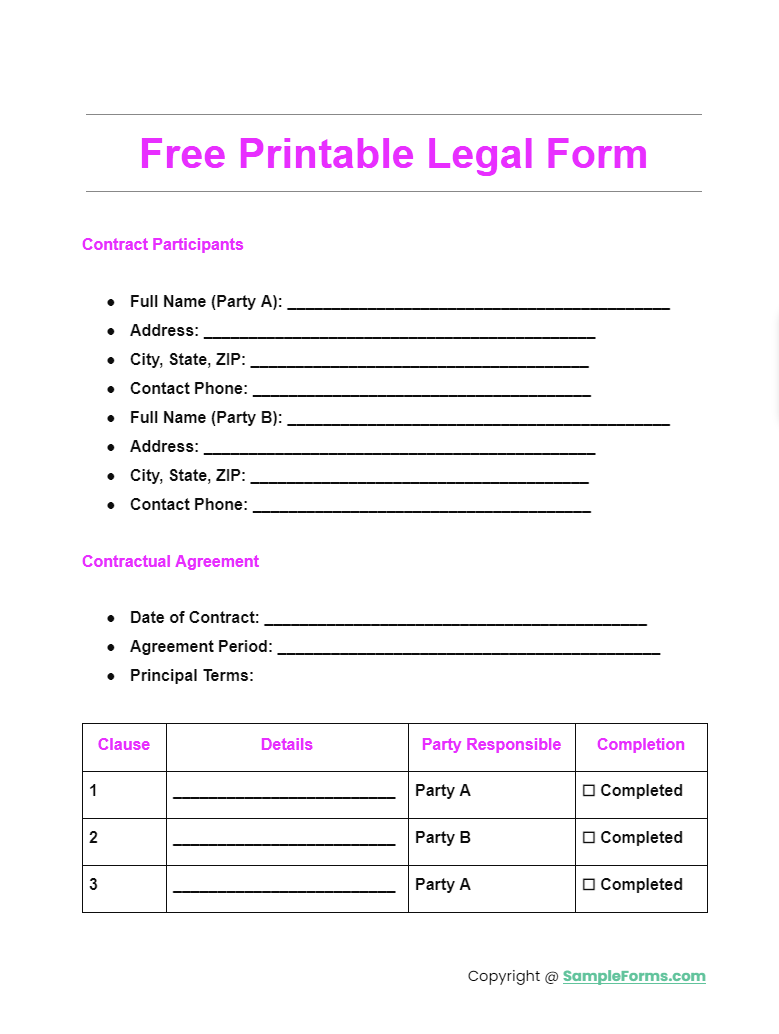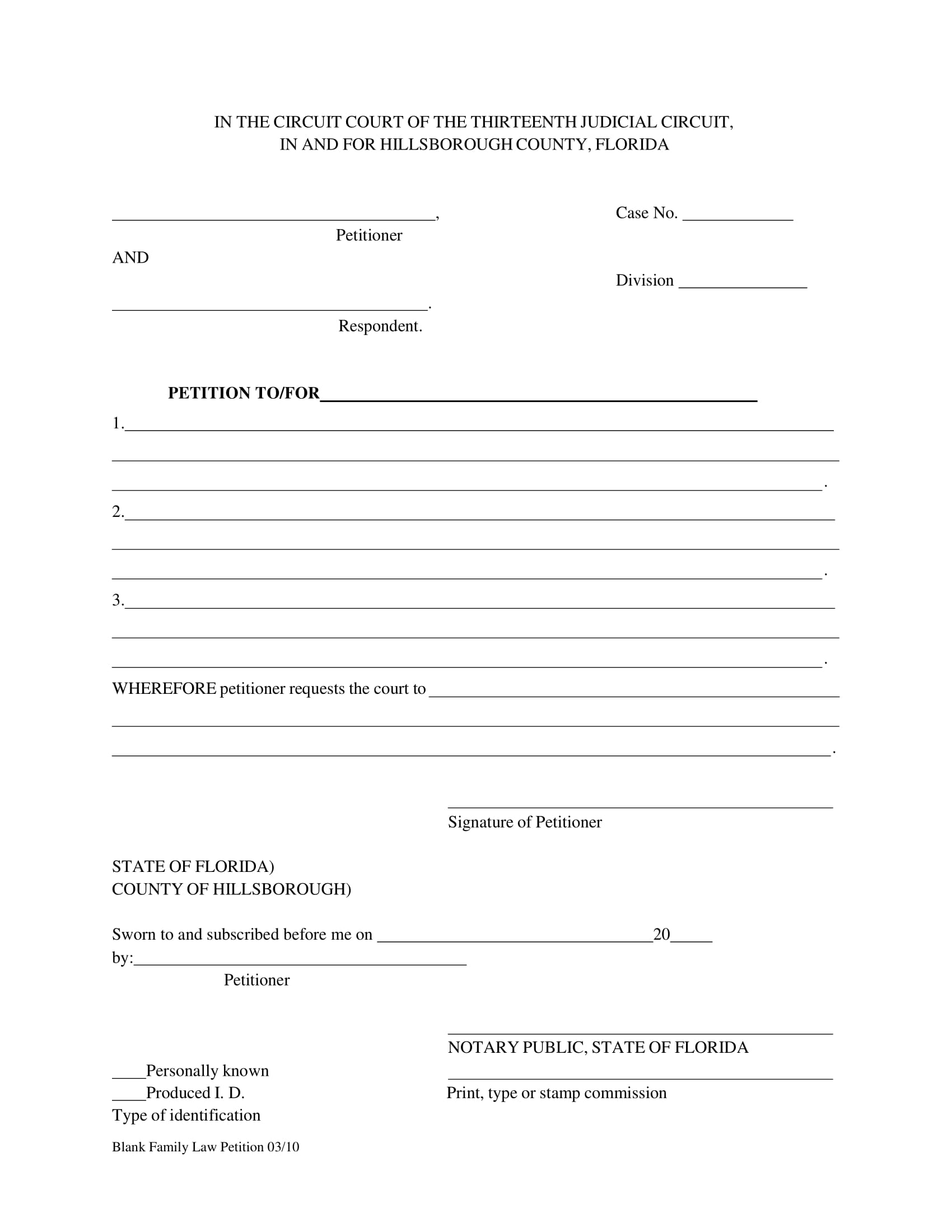Unlock Legal Clarity: Free Printable Legal Documents You Can Use Today
Navigating the legal landscape can feel daunting, especially when you’re facing common life events like renting a property, loaning money to a friend, or planning for the future. The good news? You don’t always need an expensive lawyer to get started. Many free, printable legal documents are readily available online, offering a straightforward way to protect your interests and ensure clarity in various situations.
This article dives into the world of free printable legal documents, exploring what they are, where to find them, and when they can be useful. We’ll equip you with the knowledge to confidently leverage these resources, empowering you to take control of your legal needs.
Understanding Free Printable Legal Documents
These documents are pre-written templates designed to address common legal scenarios. They are typically:
- Fill-in-the-blanks: You personalize them by inserting relevant information specific to your situation.
- Legally Sound (Generally): While not a substitute for personalized legal advice, they are often drafted by legal professionals or based on established legal principles.
- Widely Available: Numerous websites offer these documents, making them easily accessible.
- Cost-Effective: The primary advantage is their free nature, saving you significant costs compared to hiring a lawyer for basic needs.
Important Note: While these documents are a valuable resource, they are not a replacement for professional legal counsel. If you have complex legal issues or require highly specialized advice, consulting an attorney is always recommended.
Where to Find Free Printable Legal Documents
Several reputable online platforms provide a wealth of free legal document templates. Here are some of the most popular and reliable sources:
- LegalZoom: Offers a variety of free legal forms, including those related to estate planning.
- Rocket Lawyer: Similar to LegalZoom, this platform provides free document templates and legal information.
- LawDepot: Known for its user-friendly interface and extensive library of legal documents, including those related to business and personal matters.
- Docracy: A more community-driven platform, offering a range of free legal documents, often contributed by legal professionals.
- US Legal Forms: This website boasts a vast collection of legal forms, covering a wide range of topics and often state-specific.
Tip: Always carefully review the website’s terms of use and privacy policy before downloading any documents.
Common Types of Free Printable Legal Documents
The range of available documents is vast. Here are some of the most frequently used types:
- Wills: Essential for estate planning, detailing how you wish to distribute your assets after your death.
- Power of Attorney (POA): Allows you to designate someone to make financial or healthcare decisions on your behalf if you become incapacitated.
- Living Wills/Advance Healthcare Directives: Outlines your medical wishes regarding end-of-life care.
- Rental Agreements/Leases: Used to establish the terms of a rental agreement between a landlord and tenant.
- Promissory Notes: Documents used to formalize a loan agreement between two parties.
- Independent Contractor Agreements: Define the scope of work and terms of employment between a business and a contractor.
- Non-Disclosure Agreements (NDAs): Protect confidential information shared between parties.
- Bill of Sale: Records the transfer of ownership of personal property, such as a car or boat.
How to Effectively Use Free Printable Legal Documents
Here’s a step-by-step guide to maximizing the benefits of these resources:
- Identify Your Needs: Determine the specific legal document you require (e.g., a will, a lease agreement).
- Choose a Reliable Source: Select a reputable website known for providing accurate and up-to-date legal forms.
- Download and Review: Download the document and carefully read through it to understand its contents and requirements.
- Fill in the Blanks: Complete the document by inserting all the necessary information accurately and truthfully.
- Follow Instructions: Pay close attention to any instructions provided with the document, such as notarization or witness requirements.
- Sign and Date: Ensure all parties involved sign and date the document appropriately.
- Keep Copies: Maintain copies of the completed document for your records.
Limitations and When to Seek Professional Advice
While free printable legal documents are incredibly useful, they have limitations. Consider consulting a lawyer if:
- Your situation is complex: If your legal needs involve intricate details or require specialized expertise.
- Significant assets are involved: For high-value estates or complex financial arrangements.
- You’re unsure about the document’s implications: If you don’t fully understand the legal consequences of a document.
- You anticipate disputes: If you foresee potential disagreements or legal challenges.
- State-Specific laws: Remember that some state-specific laws may require a lawyer.
Conclusion: Empowering Yourself with Legal Knowledge
Free printable legal documents are a valuable tool for anyone seeking to navigate common legal situations. By understanding their purpose, knowing where to find them, and following proper usage guidelines, you can take proactive steps to protect your interests and simplify your life. Remember, these resources are a starting point. When in doubt, or if the situation is complex, consulting with a qualified attorney is always the best course of action.
FAQs: Your Questions Answered
1. Are free legal documents legally binding?
Yes, generally speaking. Provided they are properly completed, signed, and witnessed (if required), free legal documents are legally binding. However, their effectiveness depends on the accuracy and completeness of the information provided.
2. Is it safe to download legal documents from the internet?
Yes, it is generally safe, provided you obtain them from reputable sources like the ones listed above. Always ensure the website is secure (look for “https” in the URL) and review the document for any suspicious content before use.
3. Can I modify a free legal document?
While you can often modify the templates, it’s generally recommended to avoid extensive modifications unless you are familiar with legal terminology and principles. Minor changes to fill in blanks or adjust wording are usually acceptable. Consult with a lawyer if extensive modification is needed.
4. What if the free document doesn’t fit my specific needs?
If a free document doesn’t fully address your needs, you have a few options. You can search for a more specific template. You can consult with a lawyer to customize a template. Or, you can combine elements from different templates.
5. Do I need to notarize all legal documents?
Not all legal documents require notarization. Whether a document needs to be notarized depends on the document itself and the specific state laws. Wills, Power of Attorney documents, and certain property transactions often require notarization. The document will usually specify if it requires notarization.




